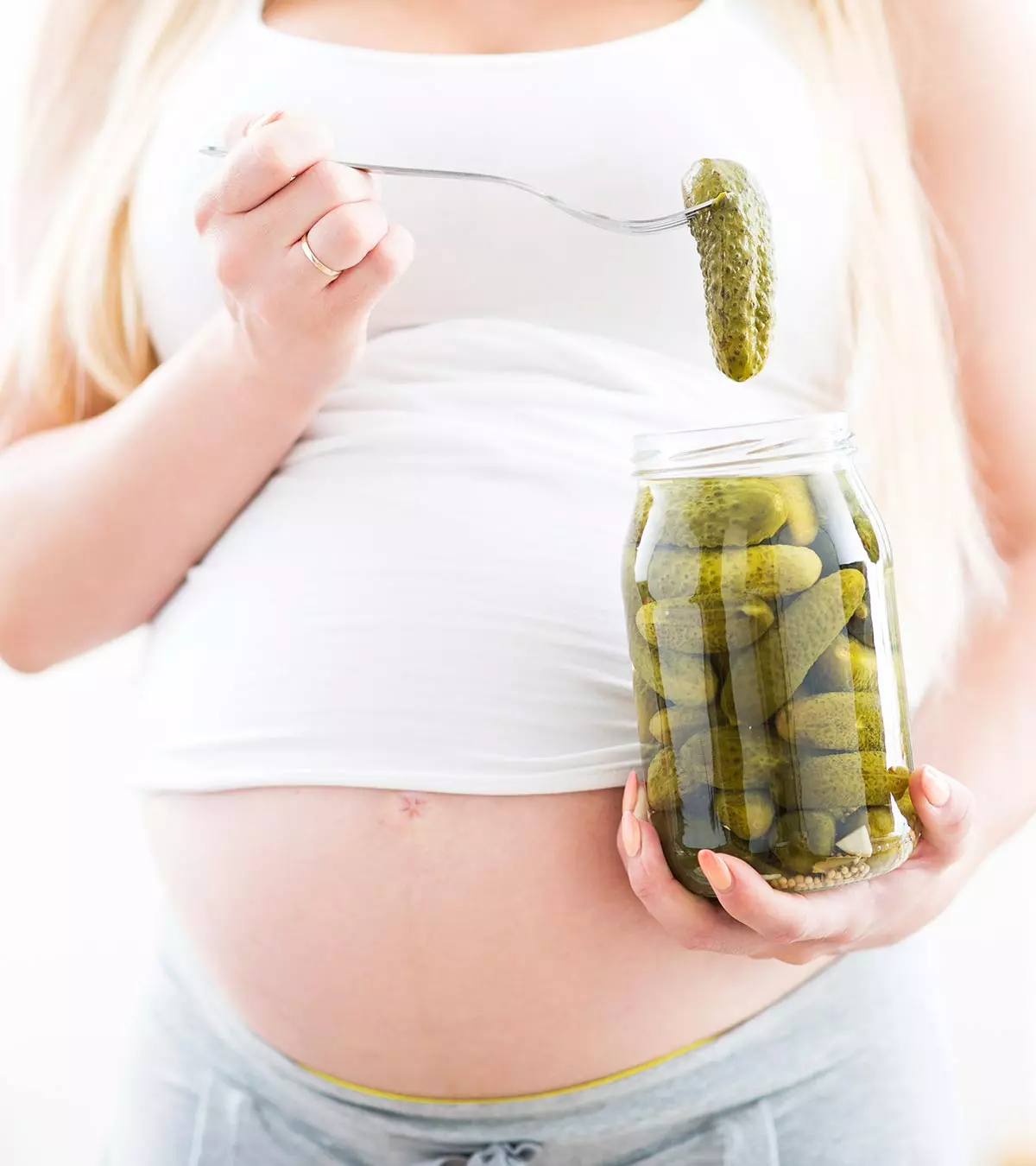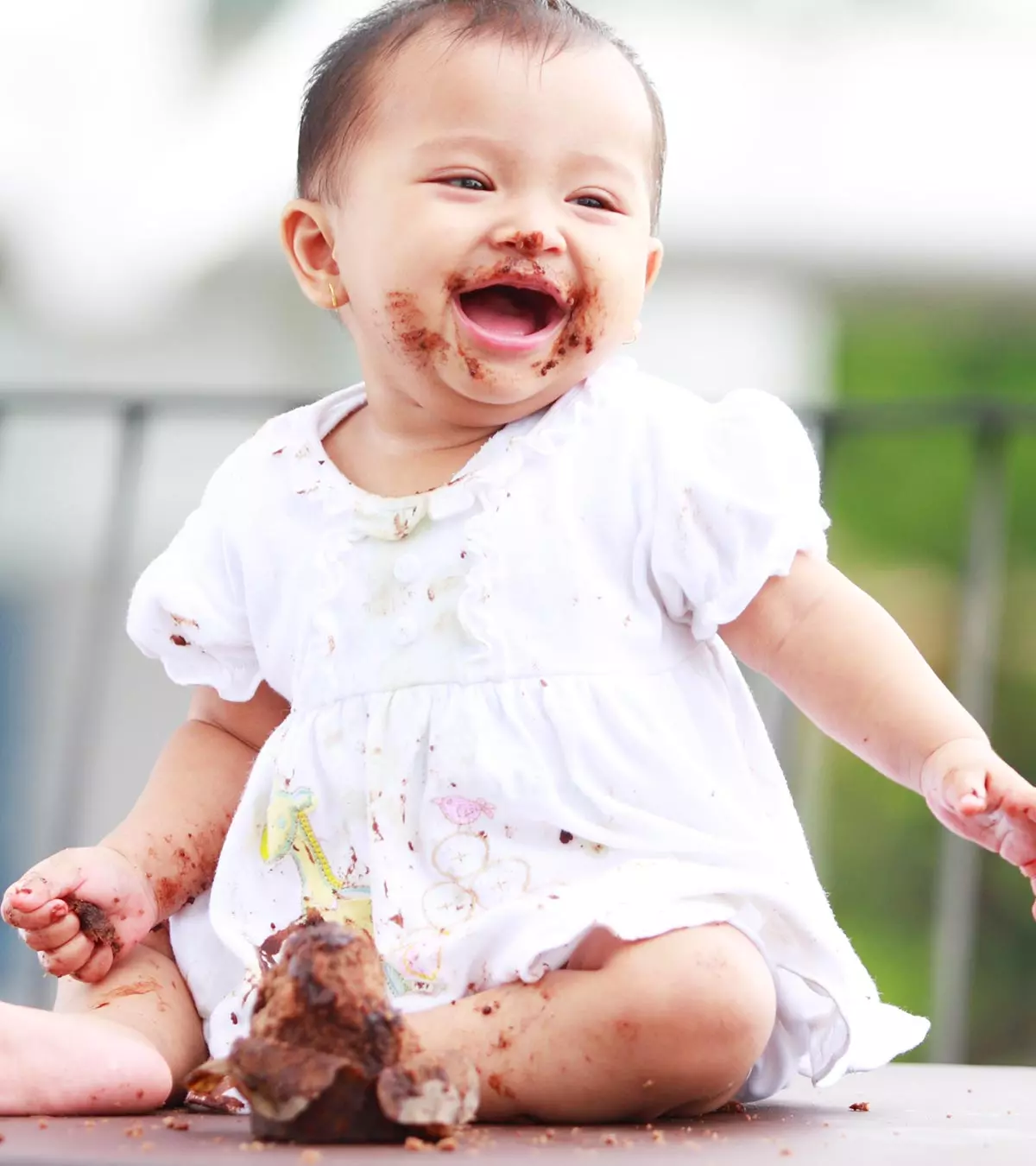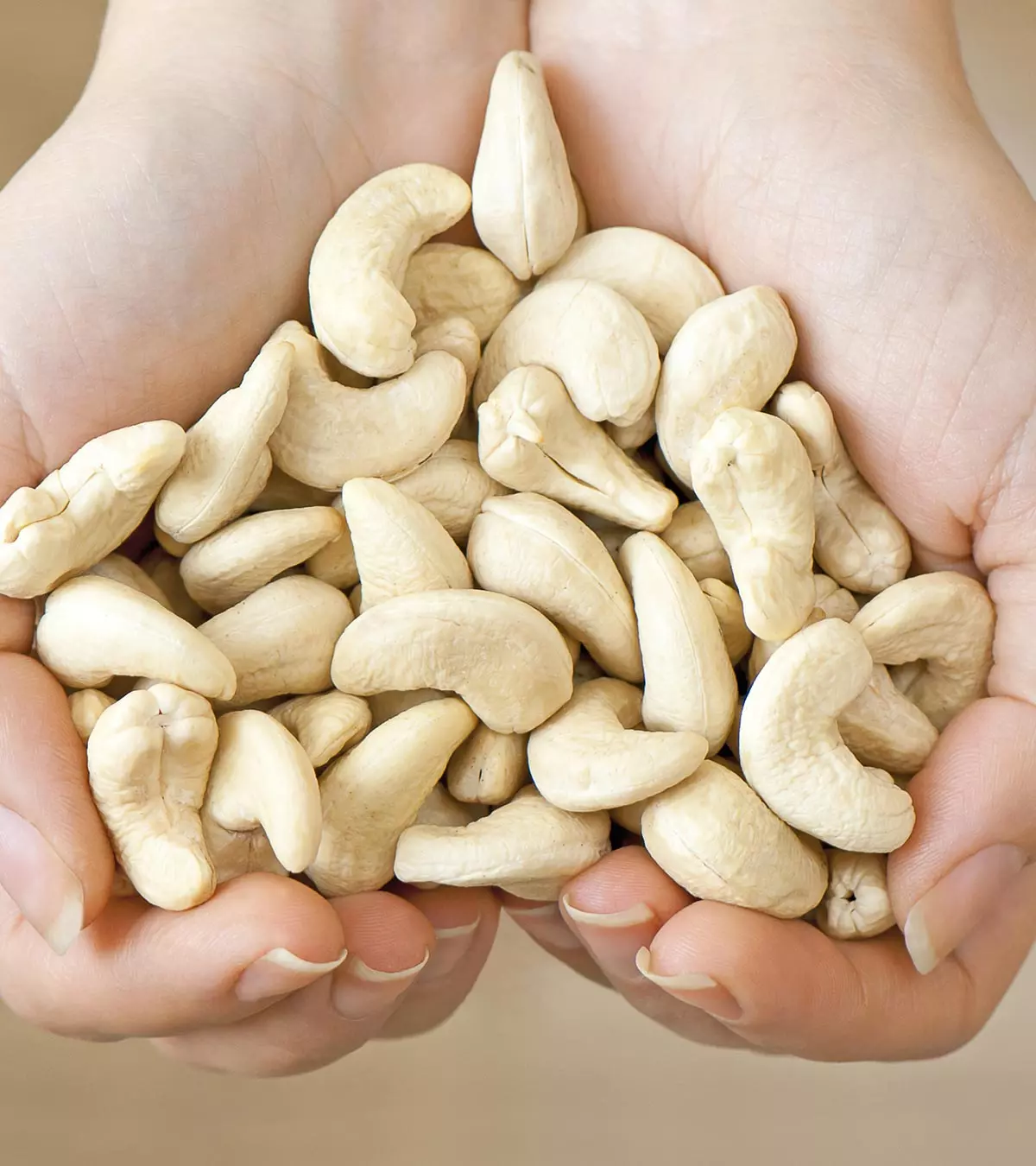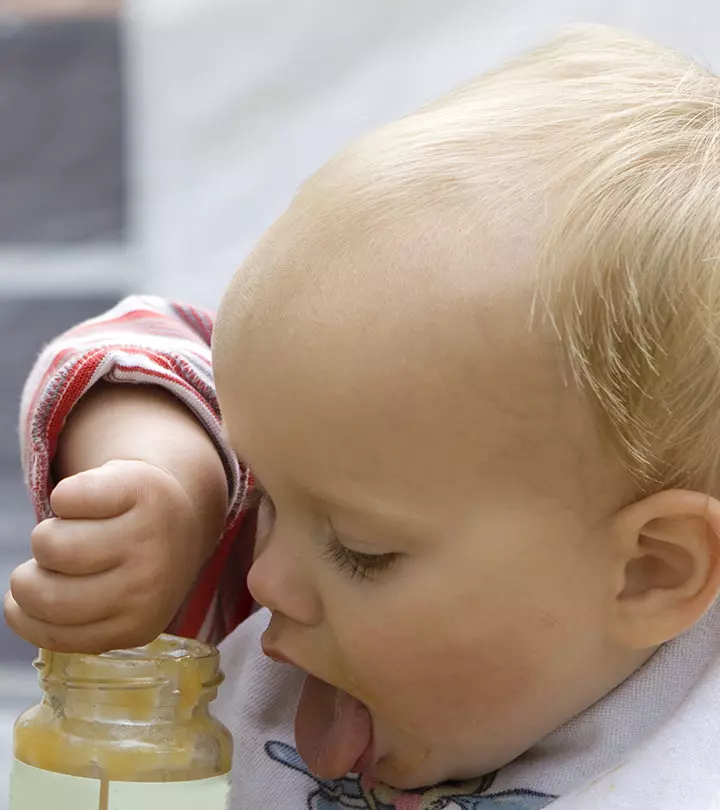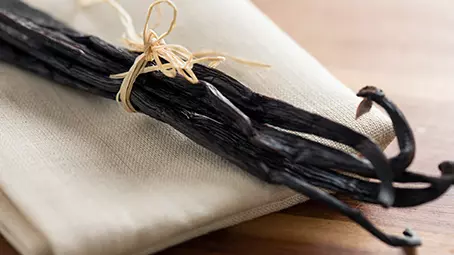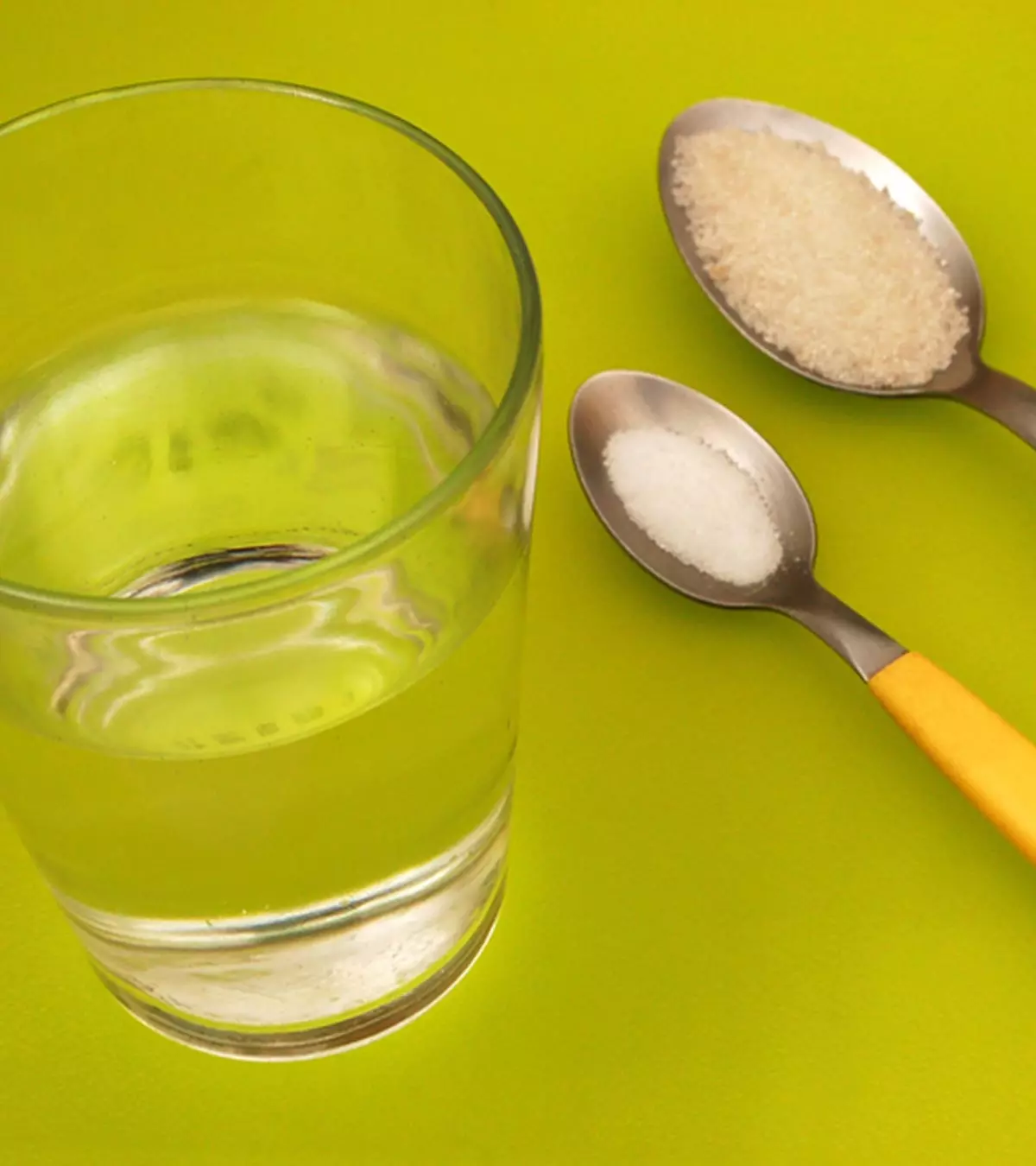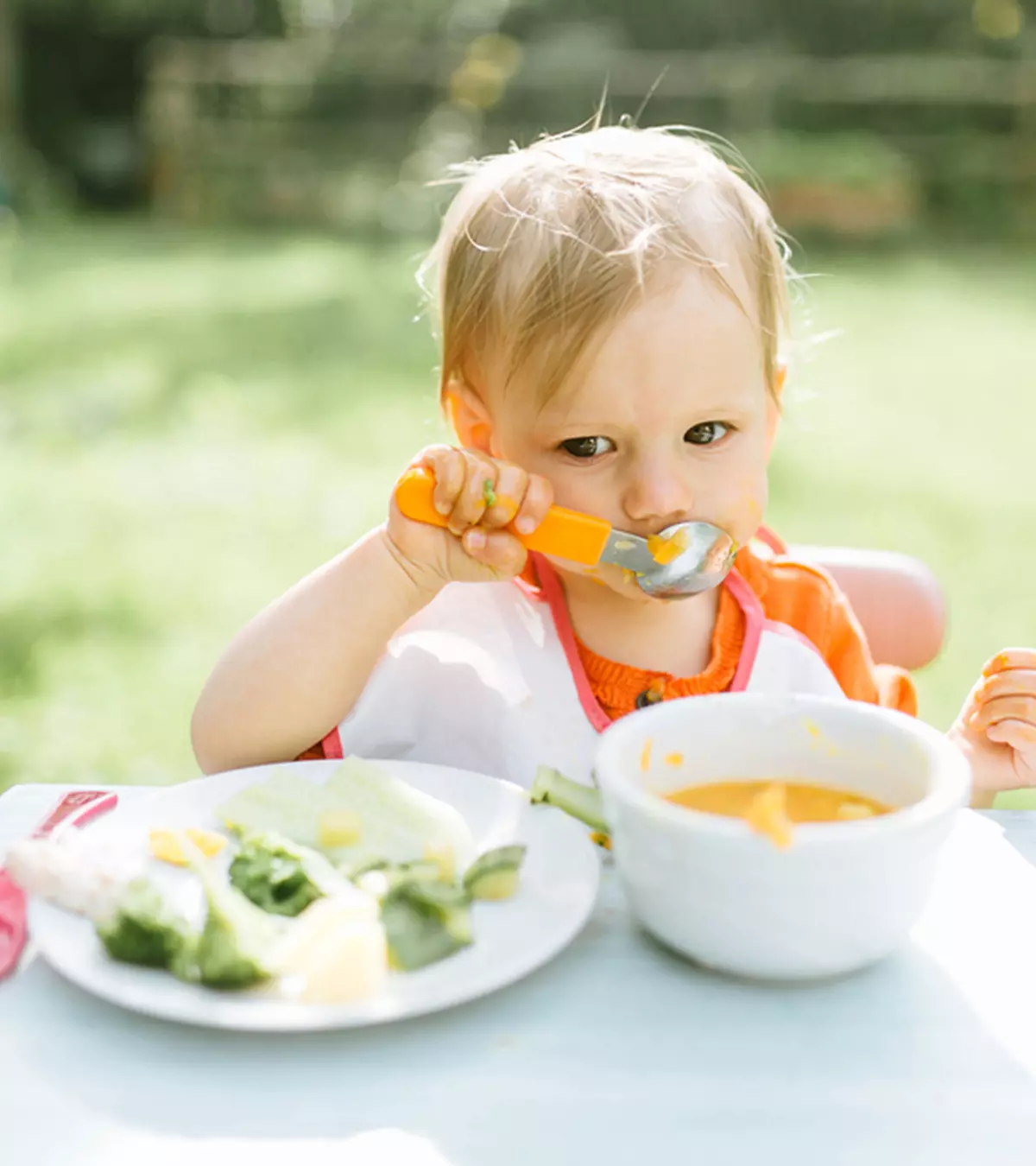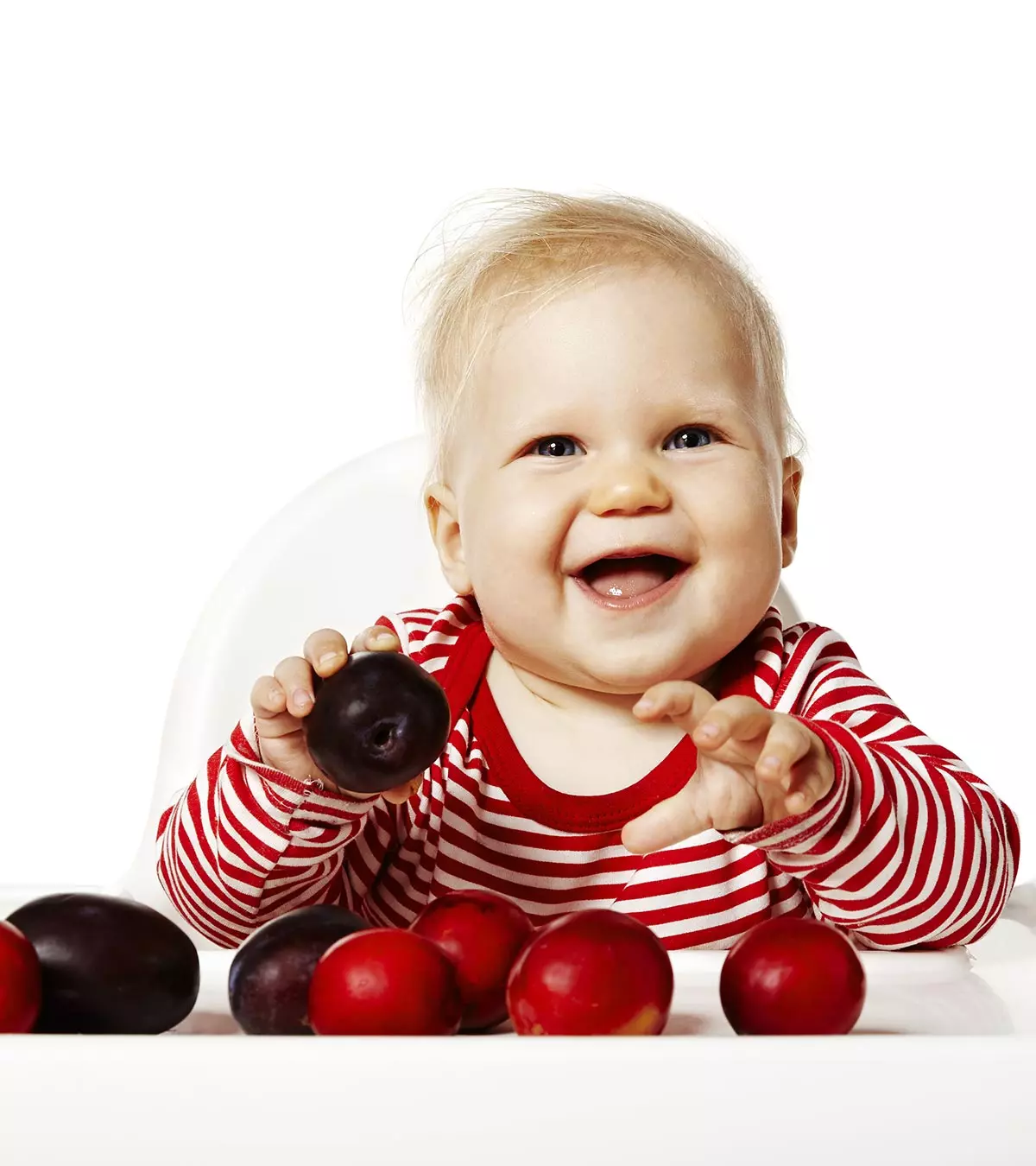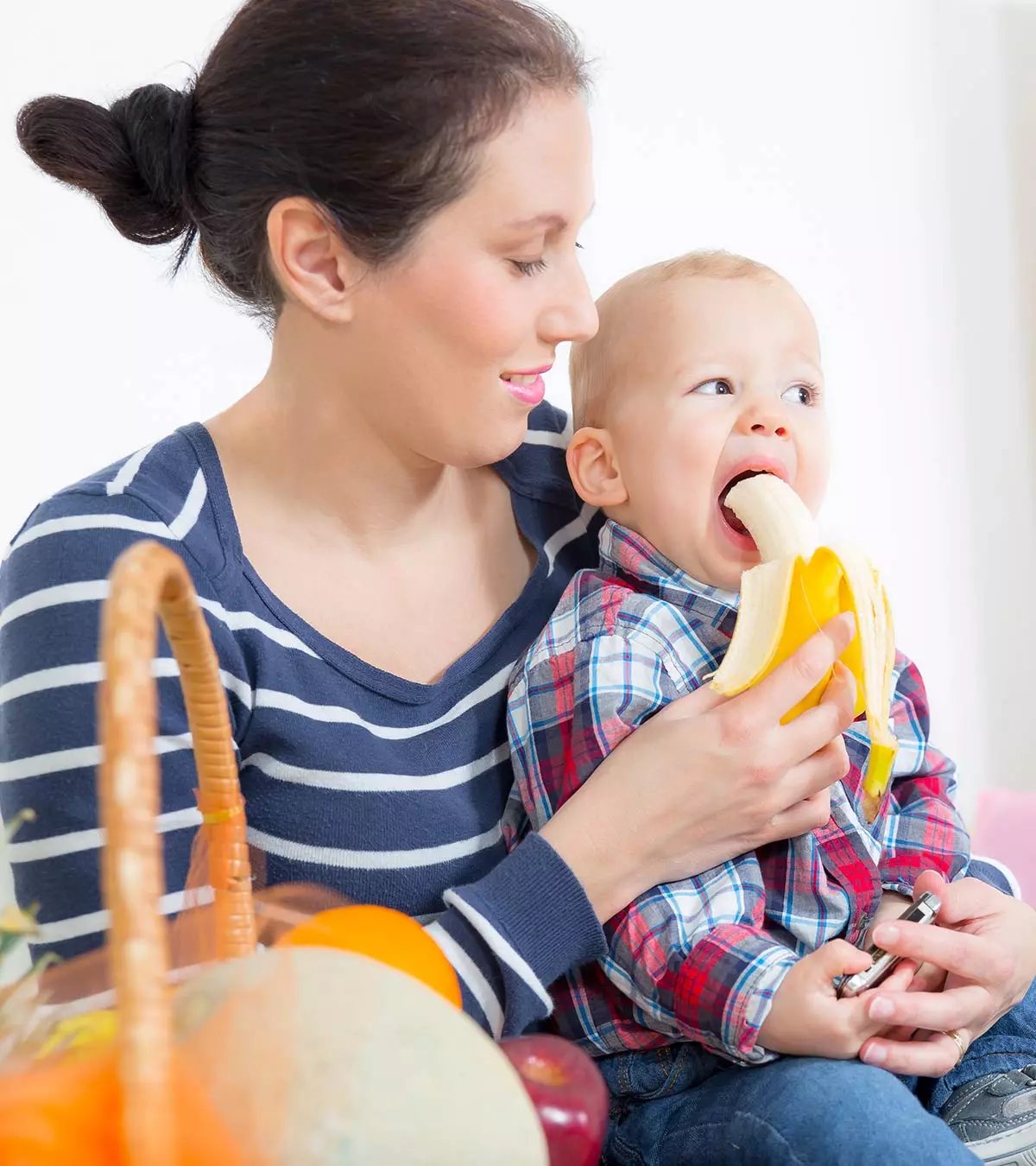
Image: Shutterstock
Bananas are wholesome and nutrient-rich and make the perfect first solid food for babies. However, you must look out for banana allergies in babies when introducing the fruit to your little one. Banana allergy, although rare, can lead to severe reactions in sensitive children, and therefore, knowing the causes, symptoms, and management strategies is crucial for parents to ensure their child’s safety. The allergy may manifest as skin rashes, gastric disturbances, or even respiratory problems (1).
It is wise to check with your pediatrician if you notice any such symptoms in your infant. Continue reading this post as we discuss the possible causes of banana allergy in your baby, its symptoms, and the measures you may take to deal with the condition.
Key Pointers
- Bananas are nutrient-rich for babies.
- However, some infants may be allergic to them.
- Banana allergies are caused by a baby’s overly sensitive immune system.
- Allergic symptoms may include hives, reddish rashes, itching, mouth and tongue swelling, flatulence, and cough.
- Steamed vegetables or other foods can be given to the baby as an alternative to bananas.
What Causes Banana Allergy In Babies?
If you find your baby vomiting, having a rash on her face or reddish look in and around the mouth soon after you feed her a banana, then it means she is allergic to bananas. Banana allergy is a type of food allergies in babies that might occur owing to various reasons.
1. Intolerance to protein
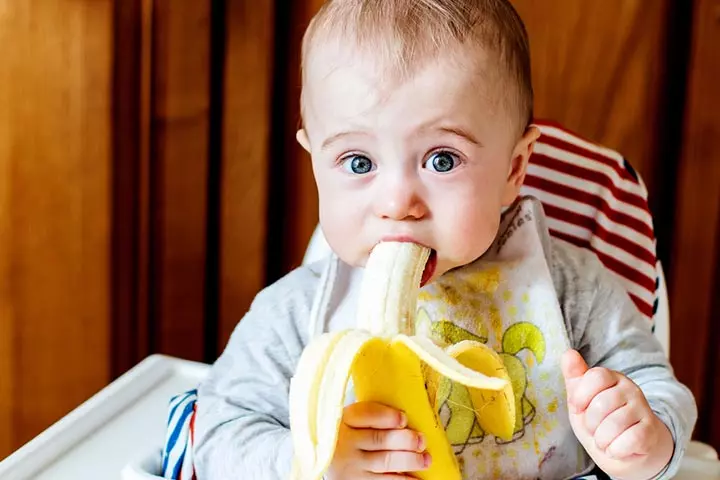
If your baby has a hypersensitive immune system, she might be allergic to bananas as her body would react in a different way. This is mainly because your baby’s immune system would have an intolerance to the protein (enzyme) found in bananas known as chitinase (2).
2. Presence of vasoactive amines
Sometimes, vasoactive amines also trigger allergic reactions. These are substances similar to histamines that occur in bananas naturally. When this substance enters your baby’s body, it would cause an allergy if your baby’s metabolizing system lacks enzyme oxidizing ability (3).
3. Latex-fruit syndrome
Washington-based registered dietician Alicia Chacha Miller explains, “Banana allergies can be linked to latex allergies due to similar proteins found in both banana plants and the rubber tree, where latex comes from. This condition is also known as latex-fruit syndrome. Other foods that may trigger a similar allergic reaction include kiwi, avocado, grapes, peaches, apples, persimmons, and olives.”
Other risk factors, including a family history of pollen or latex food syndrome and existing allergies to other fruits or vegetables, can also increase the likelihood of banana allergy in babies. Therefore, consult your pediatrician if your baby shows signs of banana allergy (4).
 Quick fact
Quick factSigns That Indicate That Your Baby Is Allergic To Bananas
If you are preparing baby food with bananas for babies for the first time, make sure you keep an eye on the following symptoms or signs associated with an allergy or anaphylaxis.
These signs can surface in your baby within a few minutes to a few hours of eating the fruit. Statistics released by the Food Allergy Research and Education (FARE) show that about 7.7% of children under 18 years in the US have food allergies. It also states that about 40% of children with food allergies are allergic to more than just one type of food.
1. Symptoms on the skin
Skin symptoms are a common sign of a banana allergy in babies. Look out for the following signs on the skin of your baby soon after you feed her mashed bananas (1).
- Hives
- Reddish bumps
- Eczema or Atopic Dermatitis
- Itchy skin
- Inflammation of the tongue
- Face swelling
- Mouth inflammation
2. Gastrointestinal tract issues

Few symptoms are associated with the gastrointestinal tract of your baby. Hence, your baby might experience one or more symptoms within a few hours of eating bananas (1).
- Stomach pain
- Nausea
- Vomiting
- Diarrhea
- Loose bowels
- Gas
3. Respiratory tract symptoms
If your baby is allergic to bananas, she might experience respiratory distress (4).
- Shortness of breath
- Moodiness
- Chest tightness
- Wheezing
- Stuffy nose
- Cough
- Runny nose
- Fainting
- Asthma
If you notice any one or two of the above said baby banana allergy symptoms while feeding a banana, stop the feeding immediately and seek assistance from your doctor at once.
Follow The Wait Rule
As soon as you introduce a new food like banana to your baby, wait for three days to check whether they exhibit any signs of an allergy. This would help you understand whether this food is safe for your baby or not.
In addition, it would be useful to inform your doctor to help him diagnose the allergic reaction easily with fewer tests.
Dealing With Banana Allergy In Babies
As soon as your baby is diagnosed with a banana allergy, make sure that you take extra care about what food you feed your baby every time.
- If your baby is facing slight allergic reactions to bananas, your doctor would advise you to feed your baby with small pieces of banana.
- You can offer a cooked banana in small portions to your baby, as it is much safer than the raw ones.
- You can give foods like steamed carrots, as it is a safe first food for babies instead of bananas.
Bananas can be used for flavoring several edible items, including medicines. Merri Lewis, whose son Sketch has a banana allergy, shares a word of caution. She says, “Do you know how many antihistamines have a natural banana flavor in it? And since banana is not a major allergen, the FDA does not require it to be posted on a label. So we had to call all these companies to ask. Yes, his Zyrtec has banana in it. Time to find a new antihistamine (i)!”
In such cases, it becomes vital to check with the pediatrician about the compounds or ingredients in your child’s medicines. This is even more important if your child is on long-term medication.
If your child has allergic reactions to bananas, it is essential to educate caregivers, family members, and babysitters about the allergy and the importance of avoiding bananas in the child’s diet. Also, check the food labels and inquire about ingredients when eating out.

 Point to consider
Point to considerFrequently Asked Questions
1. Are bananas a high allergy food?
Banana allergy is relatively rare. It is seen in 0.04% to 1.2% of the population across the world (5).
2. How do doctors test for banana allergy?
Medical history, skin prick test, total IgE estimation, specific IgE estimation, epidermal prick testing, or double-blind placebo-controlled food challenge can help diagnose banana allergy (1) (6).
3. When can I introduce bananas to my baby?
You can feed your babies mashed bananas as early as six months old. Contact your healthcare provider if the baby exhibits unusual symptoms after consuming bananas.
4. Do babies grow out of banana allergy?
There is little data to suggest the occurrence of banana allergy among babies. Moreover, follow-up studies have not been done on individuals diagnosed with this allergy. Hence, it is difficult to ascertain its outgrowing abilities. So, you should consult a doctor for advice (7).
5. Can I give bananas to my baby at night?
Feeding babies with bananas is considered beneficial as these fruits contain tryptophan that converts into serotonin and melatonin, hormones that promote calmness and better sleep (8).
While banana is a go-to food in many households and a great first solid meal for babies, loaded with essential nutrients for healthy growth and development, it may cause severe allergies in some babies. Therefore, when introducing any new food to your baby’s diet, including bananas, use the “wait rule” to see any signs of banana allergy in babies. If your baby had a severe reaction, such as rashes, swelling of the face or tongue, digestive issues, or respiratory tract symptoms, make sure your food items do not include any traces of bananas.
Infographic: Symptoms Of Banana Allergy In Babies
Bananas are a great solid food for infants since they are nutrient-rich. However, watch out for allergies while introducing the fruit. Scroll through this infographic to find out the symptoms associated with banana allergy. Save and share it with parents of other infants too.
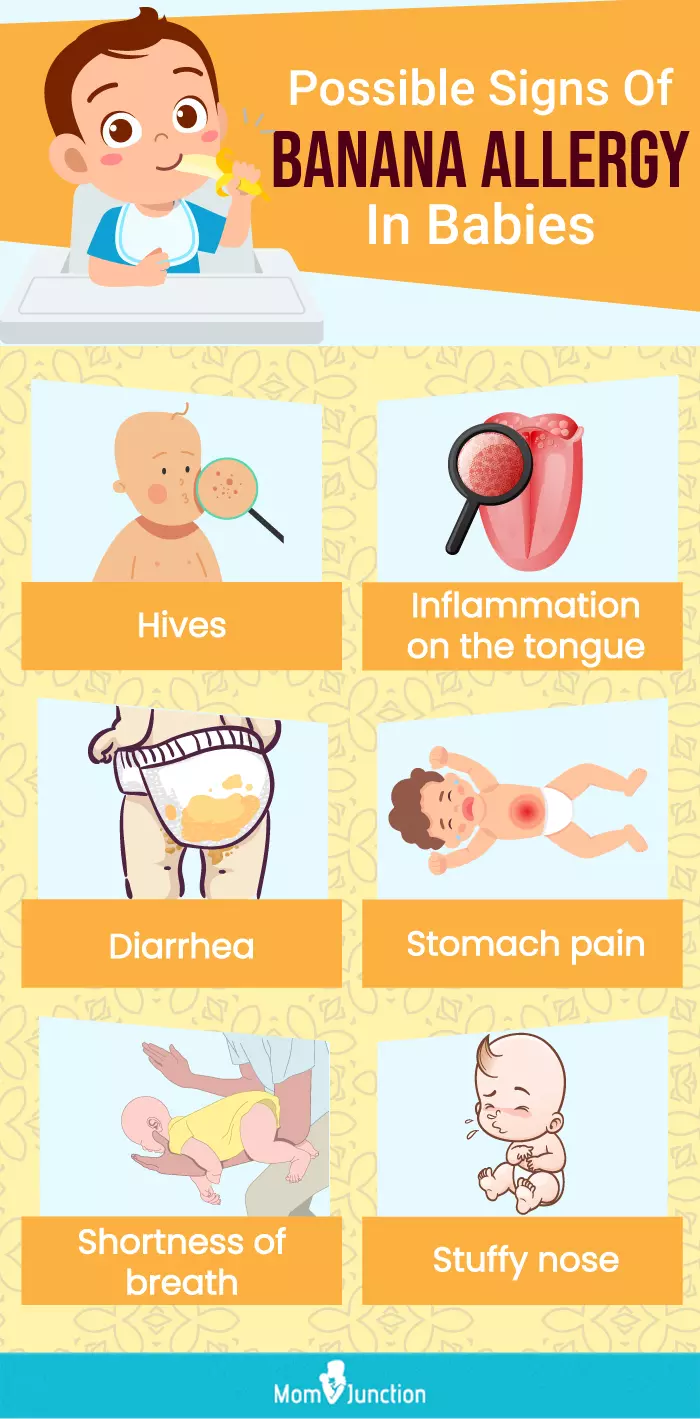
Illustration: Momjunction Design Team
Illustration: Banana Allergy In Babies - Causes And Symptoms
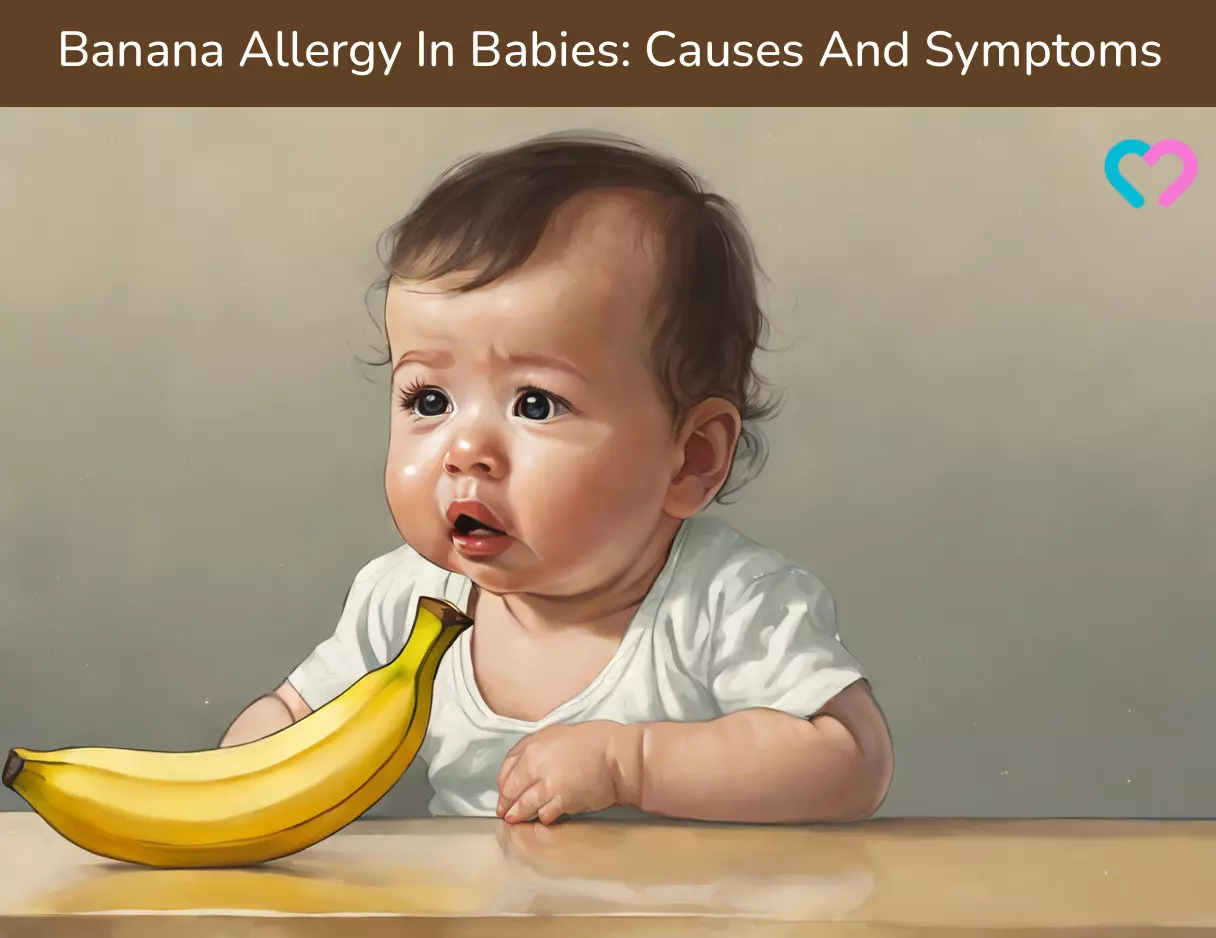
Image: Stable Diffusion/MomJunction Design Team
Personal Experience: Source
MomJunction articles include first-hand experiences to provide you with better insights through real-life narratives. Here are the sources of personal accounts referenced in this article.
i. Sketch and our journey with food allergies.https://merrilewis.wordpress.com/tag/banana-allergy/
References
- Evaluation of Banana Hypersensitivity Among a Group of Atopic Egyptian Children: Relation to Parental/Self Reports.
https://www.ncbi.nlm.nih.gov/pmc/articles/PMC3636449/ - Heterogeneity of banana allergy: characterization of allergens in banana-allergic patients.
https://pubmed.ncbi.nlm.nih.gov/12452211/ - Sensitivity to food additives, vaso-active amines and salicylates: a review of the evidence.
https://www.ncbi.nlm.nih.gov/pmc/articles/PMC4604636/ - Banana.
https://www.anaphylaxis.org.uk/fact-sheet/banana/ - Banana anaphylaxis in Thailand: case series.
https://www.ncbi.nlm.nih.gov/pmc/articles/PMC7016326/ - An evaluation of banana allergy in children living in the Mediterranean region. https://journals.tubitak.gov.tr/cgi/viewcontent.cgi?article=2035&context=medical
- Allergy information for: Banana (Musa acuminata; Musa balbisiana(hybrid)).
http://research.bmh.manchester.ac.uk/informall/allergenic-food/index.aspx?FoodId=5 - 7 Superfoods for Sufficient Sleep.
https://www.pihhealth.org/wellness/articles/7-superfoods-for-sufficient-sleep/
Community Experiences
Join the conversation and become a part of our nurturing community! Share your stories, experiences, and insights to connect with fellow parents.
Read full bio of Dr. Priya Thomas
- Alicia Chacha Miller is a registered dietitian specializing in maternal and pediatric nutrition. She holds an MS in Nutrition Science from the University of Southern California and founded Cardamom Nutrition.
 Alicia Chacha Miller is a registered dietitian specializing in maternal and pediatric nutrition. She holds an MS in Nutrition Science from the University of Southern California and founded Cardamom Nutrition.
Alicia Chacha Miller is a registered dietitian specializing in maternal and pediatric nutrition. She holds an MS in Nutrition Science from the University of Southern California and founded Cardamom Nutrition.
Read full bio of Jessica Albert
Read full bio of Swati Patwal
Read full bio of Vidya Tadapatri










